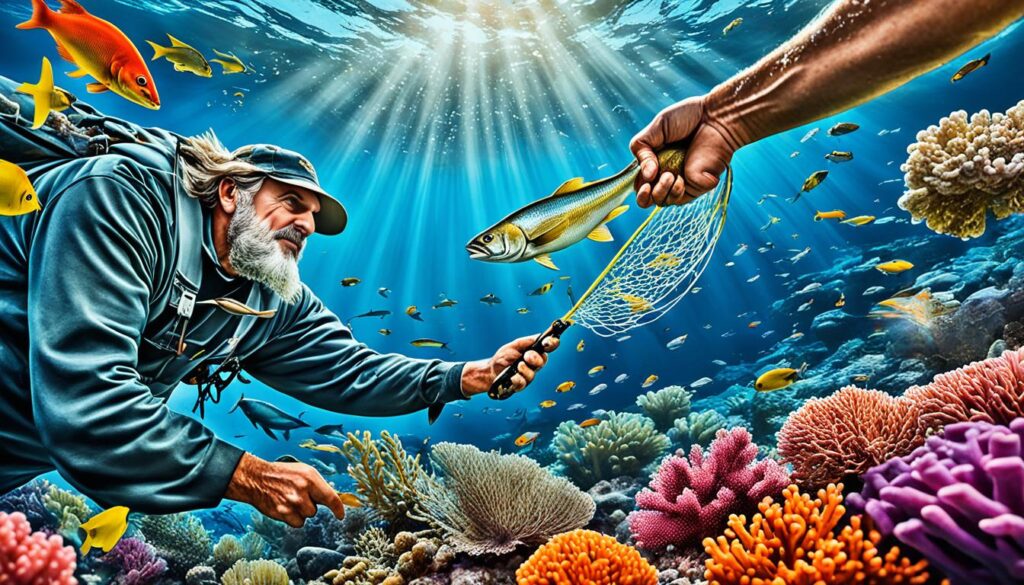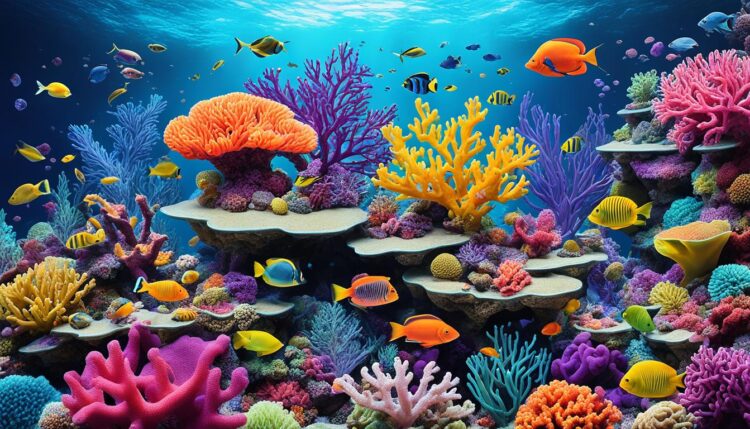Coral reefs, often referred to as the rainforests of the sea, are arguably some of the most vital and vibrant ecosystems on Earth. They serve as a fundamental cornerstone for marine life, offering habitat to a quarter of all marine species, despite occupying less than 0.2% of the seabed. Besides housing an estimated million animal and plant species, coral reefs hold critical importance for over 500 million people globally, providing food, employment, and coastal protection.
Key Takeaways
- Coral reefs are essential to marine ecosystems and ocean health.
- They provide habitat for a quarter of all marine species.
- Coral reefs occupy less than 0.2% of the seabed but are home to an estimated million species.
- Over 500 million people worldwide rely on coral reefs for food, employment, and coastal protection.
- Protecting coral reefs is crucial for maintaining biodiversity.
Introduction to Coral Reefs
Coral reefs are some of the most dynamic underwater structures on our planet. Understanding coral biology is essential to appreciating what these fascinating ecosystems represent. Composed primarily of calcium carbonate, these vibrant underwater cities are built by tiny coral polyps and offer a haven for countless marine organisms.
What Are Coral Reefs?
Coral reefs are marine ecosystems characterized by their rich biodiversity and ability to support an immense variety of marine life. Thriving in warm, shallow waters close to coastlines, they provide habitat for colorful fish, invertebrates, and marine plants. By understanding the intricacies of coral biology, scientists can grasp how these reefs contribute significantly to marine biodiversity.
The Formation of Coral Reefs
The process of reef formation is a marvel of nature, occurring over thousands of years. It all begins with tiny, yet crucial, coral polyps. These marine organisms secrete calcium carbonate, gradually creating extensive limestone structures. These formations not only become the foundation for coral reefs but also support other critical ecosystems like mangroves and coastal forests. Thus, through coral biology and reef formation, coral reefs play a fundamental role in fostering marine biodiversity.
Role in Marine Biodiversity
Coral reef ecosystems play a vital role in maintaining marine biodiversity. These dynamic structures not only support an extensive array of marine life but also contribute significantly to the health of other marine habitats.
Home to Marine Species
Coral reef ecosystems are home to a diverse range of species, including fish, crustaceans, and mollusks. The complex structures of these reefs provide shelter and breeding grounds for various marine animals, ensuring their survival and proliferation. The biodiversity within these ecosystems is pivotal for the ecological contributions they make to the broader marine environment.
Contributors to Other Ecosystems
Coral reefs also have a substantial impact on other marine habitats. By trapping and shaping sand and sediment, they facilitate the formation of additional critical habitats, such as shallows and mangroves. These interconnected ecosystems rely on the physical presence of coral reefs to maintain their ecological balance and productivity.
Coastal Protection Offered by Coral Reefs
Coral reefs serve as natural barriers that play a crucial role in coastal protection, safeguarding shores from the immense power of waves and tropical storms. Spanning over 150,000 kilometers of shoreline across more than 100 countries, these reefs offer significant storm protection and shoreline stabilization. By absorbing the energy from waves, they mitigate the destructive impact on coastal regions, thus efficaciously preventing coastal erosion.
Wave Energy Absorption
The ability of coral reefs to dissipate wave energy is essential for minimizing damage to coastal areas. As waves travel over the reefs, they break and lose a significant amount of energy. This process not only protects the shorelines but also conserves inland ecosystems. Such efficient wave energy absorption underscores the reefs’ importance as a primary storm protection measure.
Reduction of Coastal Erosion
By reducing the force of incoming waves, coral reefs directly contribute to the reduction of coastal erosion. The presence of these intricate structures along the coastlines ensures that sediments remain stable and shorelines are less prone to degradation. This role is critical in maintaining long-term shoreline stabilization and protecting human settlements and marine environments alike. The natural barriers formed by coral reefs continuously prove their value in defending against the erosive power of natural phenomena such as hurricanes and cyclones.
Coral Reefs as a Food Resource
Coral reefs are fundamental to numerous marine and coastal ecosystems, offering a primary source of protein for many developing communities. Notably, they contribute significantly to sustainable fisheries by providing habitats for various marine species. This section delves into the essential role that coral reefs play as a food resource.
Fish and Crustaceans
Coral reefs sustain a high biodiversity, enabling subsistence fishing practices that are crucial for local diets. The diverse marine life includes an abundance of fish and crustaceans, which are vital protein sources. Effective management of these reefs ensures that they can support both subsistence and commercial fishing, ultimately contributing to the sustainable fisheries of many regions.
Impact on Local Communities
The health of coral reefs directly impacts the livelihoods of millions of people worldwide. Subsistence fishing serves as a significant part of daily life for these communities, offering an essential protein source and economic stability. Implementing strategies that support sustainable fisheries can help preserve these ecosystems, ensuring long-term benefits for those who depend on them.
The table below highlights the critical role of coral reefs in supporting fish and crustacean populations, showcasing their importance as a food resource.
| Marine Life | Importance | Actions for Sustainability |
|---|---|---|
| Fish | Primary food source and protein intake | Implementing sustainable fisheries practices |
| Crustaceans | Economic and nutritional importance | Monitoring and managing harvests |
Economic Importance of Coral Reefs
Coral reefs hold immense economic value, serving as vital assets to *coastal economies* worldwide. Their multifaceted benefits permeate through various sectors, profoundly influencing tourism, recreation, protection, and employment.
Tourism and Recreation
Reef tourism stands out as one of the leading economic drivers in tropical regions. These vibrant ecosystems draw millions of visitors each year who engage in activities such as scuba diving, snorkeling, and marine cruises. The allure of these underwater paradises injects substantial revenue into *coastal economies*, boosting local businesses and fostering the hospitality industry. The economic value generated by reef tourism cannot be overstated, as it supports a diverse range of services from transportation to guided tours.
Protection and Employment
Beyond tourism, coral reefs significantly contribute to coastal protection. These natural barriers mitigate the impact of waves and storms, safeguarding coastal infrastructures from erosion and damage. This protection confers economic value by reducing the need for costly artificial defenses and reconstruction efforts.
Moreover, coral reefs play a crucial role in employment. They sustain fishing communities by providing habitats for a plethora of marine species, ensuring a steady supply of fish and other seafood. Additionally, the reef tourism sector creates numerous job opportunities, ranging from tour operators to conservationists. Thus, the interwoven benefits of coral reefs bolster coastal economies while maintaining ecological balance.
| Aspect | Economic Impact |
|---|---|
| Tourism and Recreation | Boosts local businesses, fosters hospitality industry, supports diverse services |
| Protection | Reduces the need for artificial defenses, safeguards coastal infrastructure |
| Employment | Creates jobs in fishing communities and tourism sector |
Coral Reefs’ Contribution to Medicine
Coral reefs are powerhouses for biomedical research, offering a myriad of benefits for modern medicine. These intricate ecosystems serve as natural pharmacies, providing unique chemical compounds that are being studied for pharmaceutical uses.
Key among these benefits are coral-derived treatments that hold promise for combatting serious ailments such as cancer and bone diseases. Due to their stationary nature, corals have developed complex bioactive molecules to fend off predators and heal themselves. Researchers are now tapping into these resources to develop innovative medications.
Moreover, coral skeletons are being utilized in bone grafting procedures. Their porous, limestone structure is strikingly similar to human bone, making them ideal for medical applications. The vast, yet-to-be explored biodiversity within coral reefs holds the potential for groundbreaking discoveries that could revolutionize the field of medicine.
| Medical Application | Type of Coral-Derived Compound | Potential Benefits |
|---|---|---|
| Anti-Cancer | Secosteroids | Kills or stops the growth of cancer cells |
| Bone Grafting | Coral Skeletons | Enhances bone repair and regeneration |
| Anti-Inflammatory | Terpenoids | Reduces inflammation and promotes healing |
The promising prospects of pharmaceutical uses derived from coral reefs stand as testament to their indispensable role in the future of medicine. Further investment in biomedical research involving these aquatic marvels is vital for unlocking their full potential.
Herbivorous Fish and Coral Health
Herbivorous fish play a crucial role in maintaining the health and stability of coral reefs. These marine herbivores form an integral part of the reef ecosystem by managing algae populations, ensuring that coral formations are not overwhelmed. Their presence is essential for coral reef maintenance and the overall ecosystem balance.
The Role of Parrotfish and Surgeonfish
Parrotfish and surgeonfish are two types of herbivorous fish that are particularly important for the health of coral reefs. Parrotfish, with their beak-like jaws, scrape algae and dead coral from the reef structures, creating clean surfaces where new coral polyps can settle. Similarly, surgeonfish consume large amounts of algae, preventing it from smothering the coral. Both species contribute significantly to coral reef maintenance by promoting coral growth and rejuvenation.
Grazing and Algae Control
The grazing activity of these marine herbivores helps regulate algae levels on coral reefs. Without the presence of herbivorous fish, algae can rapidly overgrow, blocking sunlight and hindering the growth of coral. By keeping the algae in check, these fish ensure that the reef retains its ability to support diverse marine life, thus maintaining the ecosystem balance. Their continuous grazing is vital for the longevity and resilience of coral ecosystems.
Threats to Coral Reefs: Climate Change and Pollution
Coral reefs are increasingly under threat from various environmental stressors, with climate change and pollution being the most significant. These stressors impact coral conservation efforts, highlighting the need for immediate action in oceanography.
Coral Bleaching
Coral bleaching is a phenomenon where corals expel the symbiotic algae living in their tissues due to ocean warming. This process disrupts their primary source of nutrition and can lead to large-scale reef die-offs. The increasing frequency and severity of coral bleaching events are a clear indication of the ongoing environmental stressors impacting coral reefs.
Ocean Acidification
Ocean acidification occurs when the oceans absorb increased levels of CO2, resulting in lower pH levels. This acidification weakens coral skeletons, making it difficult for corals to grow and maintain their structure. Addressing ocean acidification is crucial for effective coral conservation, as it directly affects the reefs’ health and resilience.
Pollution Effects
Pollution from agricultural runoff, plastic waste, and other sources further exacerbates the stress on coral reefs. These pollutants can smother corals, block sunlight, and introduce harmful chemicals into the ecosystem. Effective management of pollution is a vital aspect of oceanography to ensure the survival of these essential marine habitats.
Destructive Fishing Practices
Unsustainable and destructive fishing practices pose a significant threat to coral reefs. Techniques such as the use of dynamite, trawls, and harmful chemicals like potassium cyanide cause irreparable damage to these vital underwater ecosystems. The physical structures of reefs are often obliterated, which directly leads to the loss of marine life that depends on these habitats.

These harmful methods not only wreak havoc on coral reefs but also contribute to habitat destruction, impacting the broader measure of marine conservation efforts. As a result, the local marine biodiversity suffers substantial losses. This effect cascades through the ecosystem, disrupting the intricate balance of oceanic life forms.
Moreover, destructive fishing practices have severe socio-economic impacts on coastal communities. Many of these communities rely heavily on healthy reef ecosystems for their livelihoods, primarily through fishing and tourism. When sustainable fishing practices are not followed, the long-term degradation of reefs and marine life leads to diminished economic opportunities.
A detailed overview of the impacts of destructive fishing practices is summarized below:
| Method | Immediate Effect | Long-Term Impact | Solution |
|---|---|---|---|
| Dynamite Fishing | Habitat Destruction | Loss of Marine Biodiversity | Adopt Sustainable Fishing Techniques |
| Trawling | Reef Structure Damage | Decline in Marine Populations | Implement Marine Conservation Measures |
| Cyanide Fishing | Poisoning Marine Life | Destruction of Coral Reefs | Enforce Eco-Friendly Fishing Laws |
Conservation Efforts and Sustainable Practices
Addressing the myriad of threats that coral reefs face requires concerted conservation efforts and the adoption of sustainable practices. Collaboration between governments, NGOs, and local communities is crucial in driving these conservation initiatives. Effective ecosystem management ensures the recovery and stability of these vital habitats.
Marine Protected Areas
Establishing marine protected areas (MPAs) is paramount in the fight to preserve coral reefs. MPAs serve to restrict damaging activities and protect biodiversity hotspots, promoting the recovery of fish populations and other marine life. These conservation initiatives are essential for maintaining healthy ecosystems, ultimately supporting local fisheries and communities reliant on marine resources.
Sustainable Tourism
Sustainable tourism practices are fundamentally important in mitigating tourism’s impacts on fragile reef ecosystems. Responsible travel involves educating tourists about the significance of coral reefs and encouraging behaviors that minimize damage, such as avoiding contact with reefs and supporting eco-friendly tour operators. By balancing economic benefits with conservation goals, sustainable tourism ensures long-term ecosystem management and health.
| Conservation Initiatives | Benefits |
|---|---|
| Marine Protected Areas | Protects biodiversity, promotes recovery of marine species, supports local communities |
| Sustainable Tourism | Reduces environmental impact, fosters eco-awareness, provides economic benefits |
Conclusion
In conclusion, coral reefs stand as indispensable guardians of our marine environment. Their critical role in sustaining marine biodiversity underscores their ecological significance. These vibrant ecosystems host a vast array of marine species, contributing not only to the health of the oceans but also to various other ecosystems worldwide. Coral reefs also play a pivotal role in coastal protection by absorbing wave energy, thereby reducing coastal erosion and safeguarding communities from storm surges.
The economic and nutritional value of coral reefs cannot be overstated. From supporting local fishing industries to bolstering tourism through their breathtaking beauty, coral reefs are integral to the livelihoods of millions. Additionally, their potential in advancing medical research opens new doors for future preservation of human health. As a food resource, they support countless coastal communities, linking human well-being directly to the health of these underwater ecosystems.
However, the survival of coral reefs faces significant threats such as climate change, pollution, and unsustainable fishing practices. These stressors can lead to devastating outcomes, including coral bleaching and ocean acidification. Therefore, concerted conservation efforts and coral reef advocacy are imperative. Through the establishment of marine protected areas and the promotion of sustainable tourism practices, we can take crucial steps towards ensuring the future preservation of these natural treasures. By addressing the challenges they face, we are not only preserving the marine environment but also securing a healthier future for all who depend on it.












